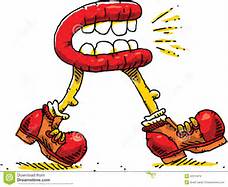
K’khol hayotzei mipiv, ya’aseh –
"As everything that comes from his mouth, he shall do...”
In Parshat Matot, it says that if a person makes a vow to do something, or takes an oath not to do something, “lo yakhel d’varo- his word shall not be desecrated or emptied – k’khol hayotzei mipiv, ya’aseh – as everything that comes from his mouth, he shall do.”
So, on the surface this is talking about keeping your word. You say you’re going to do something, you should do it. But on a deeper level, when we have an intention to do something or not do something, there’s a reason for the intention. The point is not necessarily the act itself, but the result that you intend through the act. For example, let’s say you go to work not because you necessarily like your work, but so you can make money. And you make money not because you like the money, but because you want to use the money to benefit your family. But then let’s say you use the money to buy food for your family, and someone in your family has a terrible allergic reaction to the food and gets really sick, God forbid. So now there’s a contradiction between your intention and your action; that’s called making a mistake. So, on this level, the Torah is saying that there should be a unity between your intention and your action – lo yakhel d’varo- don’t make your intentions mere empty words by doing things or not doing things that bring about the opposite result. Instead, be conscious, be attentive, be careful and do your best to act with wisdom. But wait a minute, you might say. That’s good and well, but in the example that I just gave, the food allergy isn’t something you could have known about in advance; it was a mistake. That’s the whole nature of mistakes – we don’t intend them. They happen by accident. And while it’s true and good to be as conscious and wise as you can, it’s also true that you’re going to make mistakes, because ultimately, we are not in control of what happens. So then, the next verse says, that if a child vows to do something or swears not to do something, and her father hears about it and prevents her from fulfilling her oath, Hashem yislakh lah- God forgives her, ki heini aviah otah- because her father had restrained her; it wasn’t in her control. So, who is this child the Torah talks about? It’s us. We may act with a certain intention, but the “parent” can prevent that intention from happening. Who is the parent? It’s Reality Itself – it’s the Truth of what is – as it says, Emet malkeinu efes zulato – Truth is our king and there is nothing else, meaning, there is nothing but the Truth of what is – there is nothing but God. And so, this is the paradox: on one hand, yes you should be as conscious and careful as you can with your actions – k’khol hayotzei mipiv, ya’aseh – make sure you do your best to bring about the positive result that you intend. But on the other hand, know that you have absolutely no control whatsoever over what happens. So, don’t beat yourself up over your mistakes; that’s just the ego clinging to a self-image of being successful, or good or whatever. Instead, surrender to the Truth and know that Hashem yislakh lah – you are forgiven because you weren’t really in control in the first place, so you must forgive yourself if you want to be free from hameitzar- from the separateness and narrowness of ego, and really experience anani hamerkhav Yah- the infinitely vast expansiveness of the Divine. But how do you do that? How do you come to forgive yourself so that you can experience Hashem yislakh lah – that you are truly forgiven for all your mistakes? Ultimately there is only one way, and that is that you have to forgive everyone else! As it says in Vayikra- Leviticus 10:18, ve’ahavtah l’reiakha k’mokha – love your neighbor as yourself – and if you’re not sure what it means, that you should love others like you love yourself, then right before that it says, lo titur et b’nai amekha- don’t bear a grudge against the children of your people. So, on this Shabbat Mattot, the Sabbath of the Tribes, may we be vigilant against that unconscious tendency that often happens in community, to judge other members of our tribe. Not just because it’s bad for the community and for relationships, but because when your judge others instead of forgiving others, you won’t be able to forgive yourself. The ego that judges others is the same ego that gets you stuck in self judgment. Give permission for others to be as they are, even when you have to correct them. You can accept someone in your heart even as you reprimand them for something; there’s no contradiction there. And in that acceptance, you will be able to truly accept yourself, even as you try to learn from your mistakes. And through this paradox of acceptance and action, of forgiveness and correction, may the rav tov – the abundant goodness of Being Itself, of Reality Itself, become ever more apparent, healing all who seek it. Good Shabbos!
0 Comments
Leave a Reply. |
Archives
July 2024
|
 RSS Feed
RSS Feed